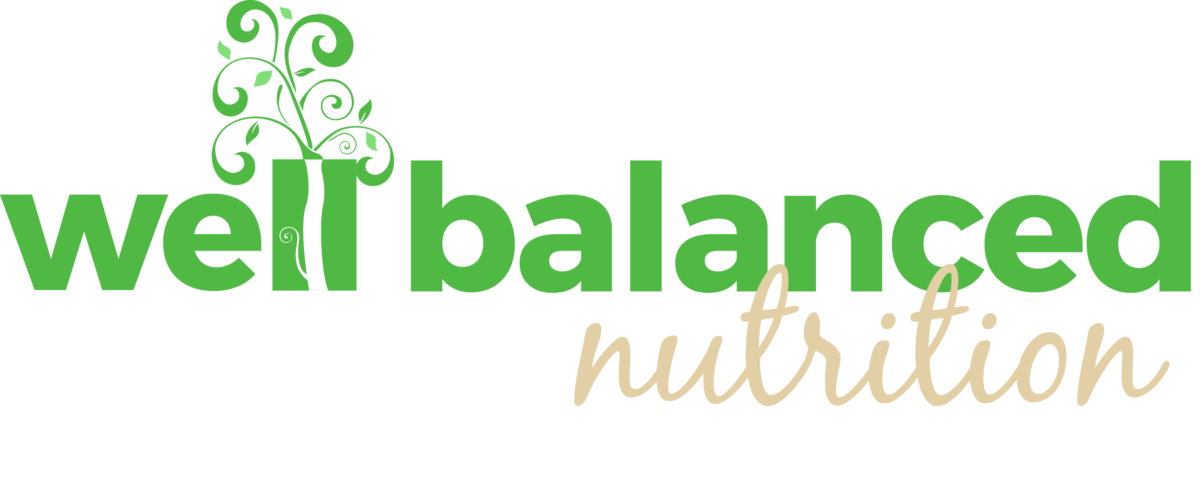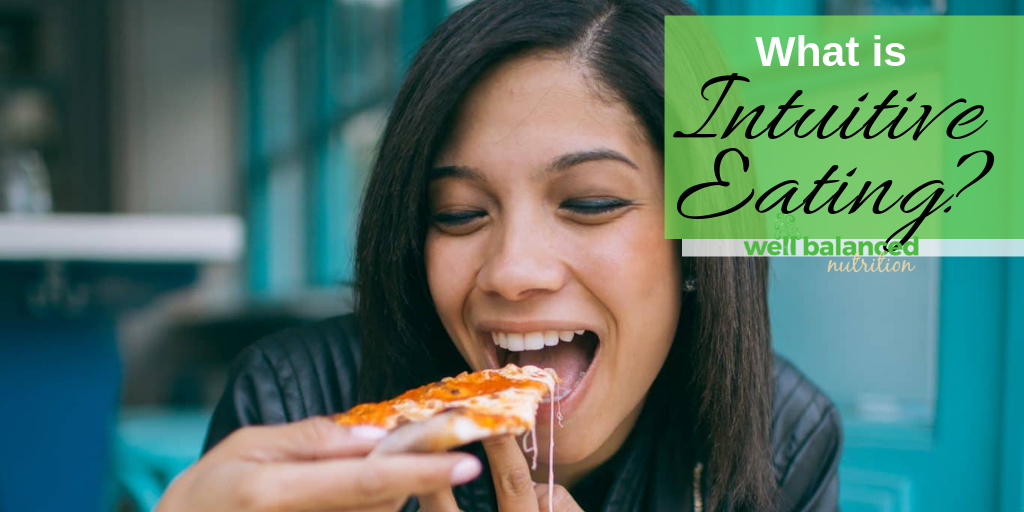
by Lucy | Apr 10, 2019 | Nutrition Questions Answered
It is an evidenced-based, mind-body philosophy comprised of 10 Principles and created by two dietitians, Evelyn Tribole and Elyse Resch in 1995. In Evelyn Tribole’s words, “Essentially, Intuitive Eating is a personal process of honoring health by listening and responding to the direct messages of the body in order to meet your physical and psychological needs. [This] includes physical activity for the sake of feeling good, rejecting the dieting mentality, using nutrition information without judgment, and respecting your body, regardless of how you feel about its shape.”
With intuitive eating, you call the shots.
Intuitive eating involves using your natural ability to be tuned into your mind and body. Only you know what hunger, fullness, and satisfaction feel like. Only you know your thoughts, feelings, and experiences. Therefore, as the expert of your own body, you may be empowered to call the shots about what, when and how much you eat.
Intuitive Eating is not a diet or food plan.
A dieter relies on outside cues and rules, whereas the intuitive eater relies on inner cues to eat as much or as little as they need. A dieter may label foods as bad or good, whereas intuitive eaters find a balance of choosing foods that feel good and foods that provide nutrition the body needs.
Will I lose weight if I use intuitive eating?
Some people will lose weight when they start to eat intuitively. Perhaps this is because when using intuitive eating they eat for emotional reasons less often and no longer have negative emotions around eating that can lead to overeating. However, intuitive eating is not designed for weight loss. It was designed as a weight-neutral approach. The goal of intuitive eating is gaining a healthy relationship with food and your body.
Why we like intuitive eating.
At Well Balanced Nutrition, we work with you to ditch the diet and become an intuitive eater. Diets do not lead to long term change, but paying attention to what your body needs, learning about nutrition, respecting your body, and implementing more self-care habits can leave you happier and healthier in the long term.
Ready to get off the diet roller coaster? You got this! Take the first step.
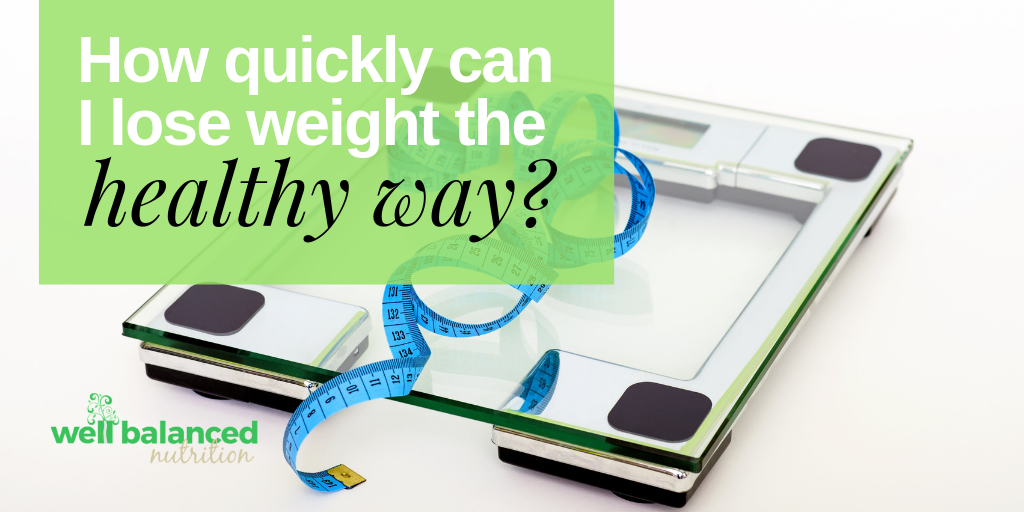
by Lucy | Feb 27, 2019 | Nutrition Questions Answered, Well Balanced Wisdom
Have you ever wondered… how do I lose weight fast?
You aren’t alone. Many people are searching for the magic pill or a secret sauce that can help them get the body they want – like by tomorrow. Unfortunately, drastic weight loss that is kept off is seldom attainable. In fact, if we look at research studies on weight loss (from various diets and methods) we find that roughly 80% of people who shed a substantial portion of their body fat will not maintain that degree of weight loss for 12 months.
What is a safe rate of weight loss?
The general recommendation is 1-2 lbs per week.* Slow and steady wins the race. Even at a slower rate, it is important to be wise about your approach and make changes that are more likely to last. Unfortunately, many people will regain some or all of weight loss regardless of how quick or slow it came off.*
What amount of weight loss is realistic and appropriate for health outcomes?
Research indicates that for people who are in the overweight or obese BMI category, a weight loss of 10% of their body weight over a 6 month period is appropriate.* This amount is likely to bring about improvements in blood pressure, blood cholesterol, and blood sugars. It’s debatable whether it is the weight loss or the healthy habits that one adopts to lose weight that really impacts health.
The best approach is wellness-focused not weight loss focused.
At Well Balanced Nutrition, we don’t recommend any trendy diets that promise to help you drop weight fast, but we do have a solution to help you feel better about your body. Our solution, the Well Balanced approach, is not just about the food you eat or the number on the scale. We want to see you healthy and happy, and we know you don’t have to drop 4 pant sizes to achieve that. By accepting yourself, improving your habits from a place of self-compassion, working on attainable action steps, embracing the journey and having some fun along the way, you’ll no longer need to strive for unrealistic ideals or fall for another fad diet attempt. Are you looking for solutions? Take the first step today.
*References:
- https://www.mayoclinic.org/healthy-lifestyle/weight-loss/expert-answers/fast-weight-loss/faq-20058289
- https://www.sciencedirect.com/science/article/pii/S2213858714702001
- https://www.nhlbi.nih.gov/files/docs/guidelines/ob_gdlns.pdf

by Lucy | Feb 21, 2019 | Nutrition Questions Answered
For Super Bowl weekend I was looking forward to eating chicken wings with celery, blue cheese dressing, and sweet potato fries. Then I woke up Saturday morning with a pit in my stomach knowing it was going to be “one of those days.” I can often tell when I wake up if I’m going to have and upset tummy that day. Typically, it starts with a lame bowel movement (sorry if that’s TMI) then it’s followed by low-grade discomfort and occasional nausea.
How do I know it’s a flare-up?
For me (Lucy), it’s been years of learning to listen to my body, tune in to my symptoms, and make adjustments. Most people feel awkward talking about their bowel movements (aka poop); however, that can often be a good indicator of how things are going in your digestive system.
Did you ever watch when Oprah would feature Dr. Oz who introduced Americans to what our intestines look? I’ll never forget, I was a sophomore in college and my mom called me geeking out because Dr. Oz was on TV talking about poop. At that time, this had become a regular topic of conversation because part of learning about food and nutrition is also learning about what comes out the other end.
Anyway, after 2012, and the unfortunate stomach virus, my digestive system changed and so did my poo. Also, one of my initial symptoms included sharp stabbing pains in my gut after I ate almost anything (thank goodness for oatmeal). Nowadays, in a flare-up I feel puffy, bloated, and extremely full after eating even a small meal. Sometimes I get a low-grade headache and nausea. Mostly, it’s just plain uncomfortable. It may take away the desire to eat regular meals and snacks.
By the way, IBS cannot be self-diagnosed. It is a functional disorder that primarily effects the bowels and includes various symptoms including irregular bowel movements, bloating, and/or nausea. There are also tests that can eliminate other potential diagnoses, such as celiac disease and Crohn’s disease.
Every body is different.
The other day while discussing IBS-like symptoms my client, Susan*, talked about the “ickiness” of discussing this problem in public. Susan had decided to do the low FODMAP diet to find out which foods were triggering her symptoms. She recognized most people don’t want to talk about what’s happening at the other end of your digestive system. Susan mostly referenced the pain and discomfort that comes with eating trigger foods. She also talked about her own symptoms, which are different than mine, and included a “gurgle-y stomach,” which was her first indicator that something that did not sit well in her gut.
Start with noticing
If you are suspicious about irregularity or other pain and discomfort in your digestive system we recommend starting to notice when, how often, and what the symptoms are. If you’re so inclined, I always recommend food and symptom journal to start to give you a better idea and understanding of how food and symptoms may be connected.
If you’re tired of feeling crappy and ready to find out ways to get on the path of healing contact us. We’re happy to help 🙂
*Name changed to protect privacy.

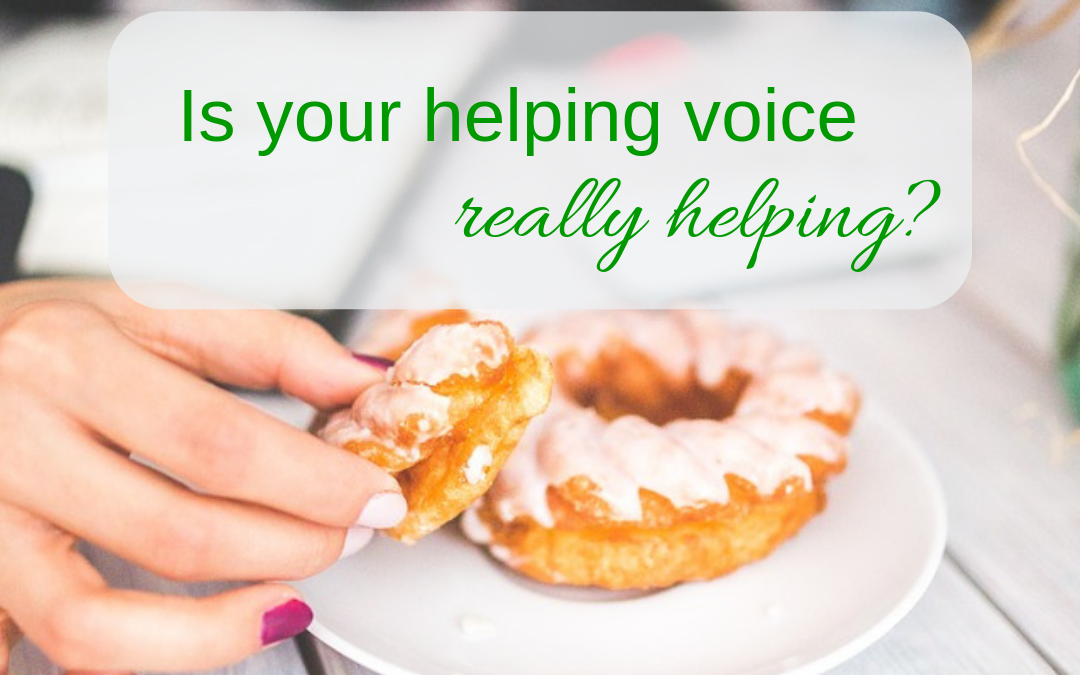
by Lucy | Feb 12, 2019 | Nutrition Questions Answered, Well Balanced Wisdom
You know that little internal conversation you have when staring at the buffet table, open bar or other indulgent food (or beverage) choice? There’s often opposing voices or thoughts going through our minds such as “it’s not that bad, “or “you know, you really don’t need that…”
You are normal
The good news, you are not crazy if you are hearing voices too! In fact, most of us have an inner helping and sabotaging voice. I think of it as friends versus an accomplice. Our friends help us when we feel down by saying comforting words that are uplifting and encouraging like this exchange with my best friend, Gretchen:
Me: I have a craving to quit my job, eat icing out of a plastic tub, and drink a margarita. Apparently, I’m feeling stressed…
G: Is it weird that we have all the same stress things? LoL
Me: Hahaha no, makes me feel less strange. And probably just confirms the soulmate best friend thing 😛
G: What’s got you so stressed?
Me: It’s the story I’m making up around people canceling or rescheduling last minute (clearly appointments with me don’t matter… Yada yada yada)
G: I’m sorry babe. I know that gets to you. You are amazing and important. Everyone overbooks and overdoes this time of year. That’s all it is.
See how Gretchen affirmed my feelings and gave me a chance to process through my negative thoughts? On the flip side, my thoughtful office mate, Richard, is more of an accomplice. When I told him that I was stressed out and craving sugar and/or booze he offered me animal crackers with icing and a beer or wine from the mini fridge. Not that he was purposely trying to sabotage me! On the surface, it sounds like those external stimulants or numbing agents are the cure to our problems, but we typically feel worse about ourselves after using comfort foods to “feel better.”
The answer is in you
I can tell you in moments of stress nothing outside of us can make what’s going on inside feel better. Sure, the chocolate may light up some happy hormones in your brain which could temporarily take away the sadness. However, often when we turn to food or a drink to deal with negative feelings those choices cause guilt or shame, which leads to the downward spiral of making more unhealthy choices.
Recently, while speaking with the client, she mentioned when she eats ice cream with her son in the evening or on weekends her sabotaging voice will say “it’s OK, you’ll do better tomorrow.” I asked, “what does your helping voice say in opposition?” She responded, “I tell myself ‘you know you’re already gaining weight and you don’t really want to gain more weight’.”
Did you notice her helping voice sounds super judgmental?
Is that helpful?
Instead, I asked, if her friend called and explained she was feeling upset and was about to eat a pint of Ben & Jerry’s ice cream “what would you say to a friend you know is trying to lose weight?” She had much more supportive words for her friend that did not include justifying or shaming her choice to eat ice cream.
Food for thought
What kind of stories is you’re sabotaging voice telling you? When do you notice yourself reaching for food or a drink to soothe your negative emotions?
How can you respond to these cravings as a friend instead of an accomplice?
Looking for a friendly dietitian to help you sort out your food cravings? We can help 🙂

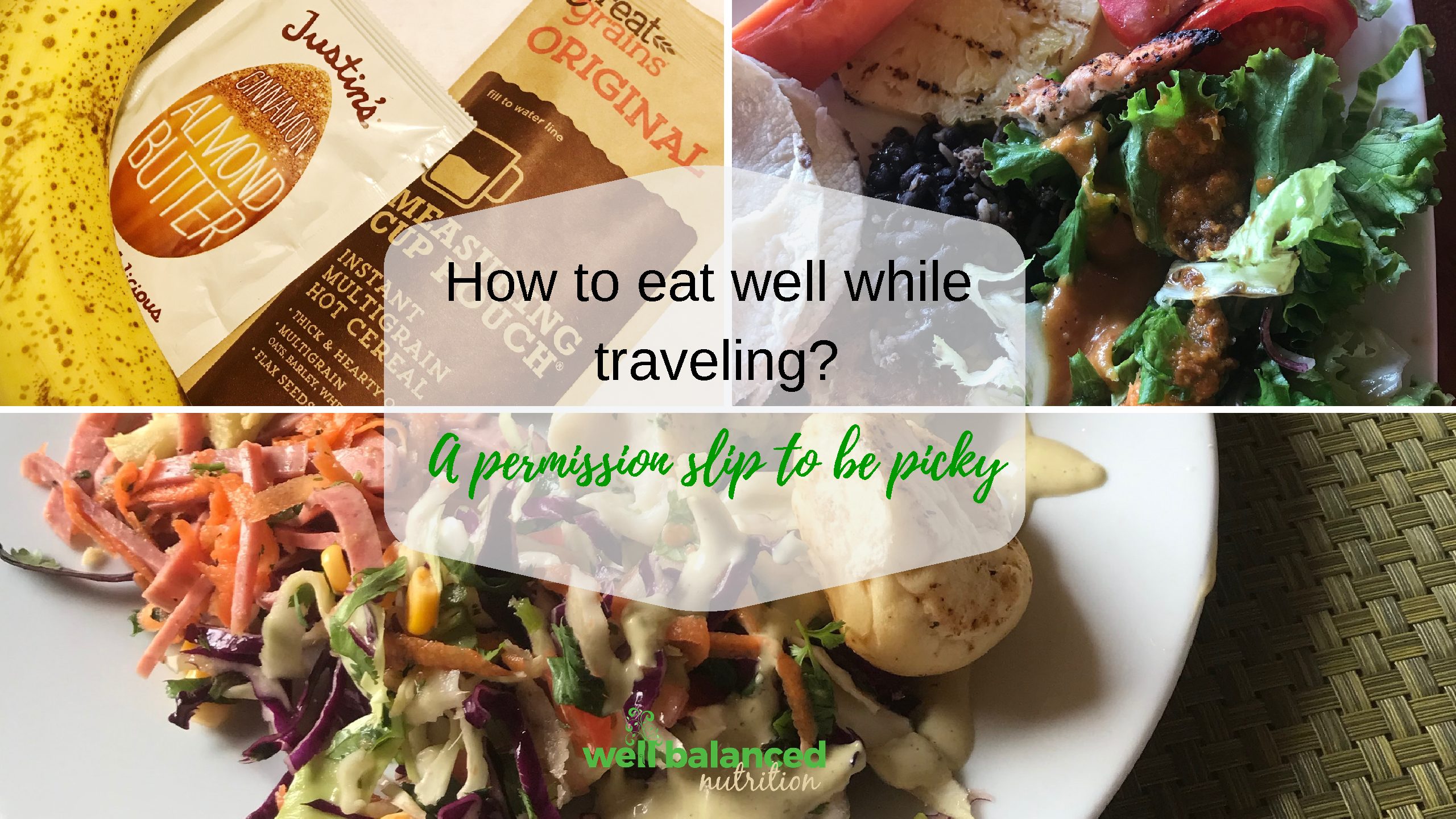
by Lucy | Feb 7, 2019 | Nutrition Questions Answered
Did you know approximately 1 in 5 of American’s have IBS and 40% of the population is living with a chronic condition?
This is a good reason to be nice to ourselves and nice to others because we don’t know what they are going through. It can be especially challenging to know how to eat well while traveling.
In January, Kristen and I went on our first international Well Balanced adventure to Costa Rica! It was an incredible trip coordinated by our new friend, Amanda Chay, with Wonderment. Needless to say, we had a lot of new experiences such as repelling down the side of the canyon into surprisingly cold water and discovering my new obsession with papaya!
As many of you know, I (Lucy), have been managing and coping with IBS for several years now. Click here to learn more. Anyway, whenever I travel, I get a little extra anxious around the lack of control regarding my food choices. In our small group of seven, we had 80% of the meals preplanned and catered to us. Normally, this sounds like a dream come true! However, when you have food sensitivities it can be more like a nightmare.
How I stay routine and regular
On our first morning in San Jose, Costa Rica, while I scooped up a small bowl of oatmeal my fiancé told our tour guide leader, Amanda, that oatmeal is a daily ritual of mine. She laughed and said, “well you can enjoy a break from that because I don’t have oatmeal on the menu for our breakfasts this week.” I laughed, I looked at Andrew and said, “isn’t she so funny?“ What Amanda did not know is I had packed six portable oatmeal packets and mini almond and peanut butter packets in order to continue my routine, which helps keep other things routine (*wink *wink).
So often, while talking about setting up healthy habits and sticking with them I hear clients say “but I don’t want to be picky or difficult.” For instance, if someone has a digestive and sinus issues they may greatly benefit by going dairy-free; however, when going to a friends house or out to eat they decide to just be polite and eat all the things despite knowing the negative effects of eating dairy products.
Change takes effort at first
Two years ago, when I did the big IBS elimination diet, I found my brain consumed thinking about “what am I going to eat at my next meal??” We’ve learned between 80 to 95% of everything we do is subconscious – think about last time you took a shower… did you think about every move you made? It takes time and energy to make conscious changes to our dietary choices, but it is possible. First, we must become aware of what and why we want to change. Then, we can make a plan and take action.
It doesn’t take that long to start feeling a little better and for your brain to pick up on new habits if you stay consistent. Some people will tell you it’s only 21 days; however, we learned from the book Better Than Before by Gretchen Rubin that on average new habits take about 66 days.
Your permission slip…
If you’re in the midst of making dietary and lifestyle changes or you already know what works for you, remember it’s OK to be picky and know that on occasion we might slip up and put cheese on the salad with ranch dressing because after all, we are human.
If you’re ready to feel better and determine which foods may be triggering inflammation and pain in your body, let’s chat.
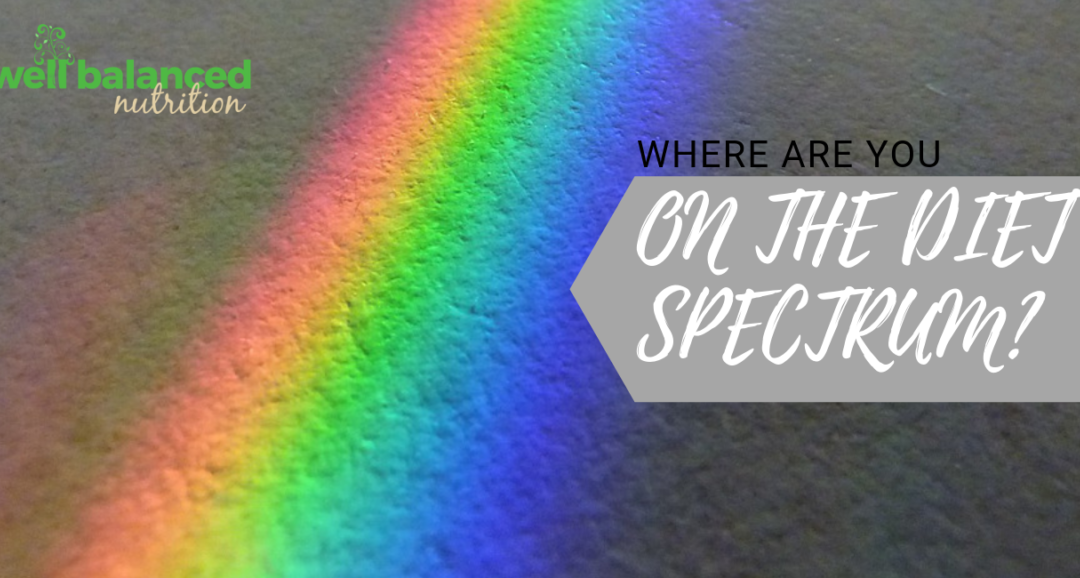
by Lucy | Nov 29, 2018 | Nutrition Questions Answered, Well Balanced Wisdom
You know how there’s a new diet or nutrition news article coming out every day?! It’s overwhelming and confusing for most people – especially those of us trying to be healthy and make better choices.
For many people, diet is a 4-letter word (literally and figuratively!) that makes one shutter and recoil. Here’s the thing, diet is simply the kind of foods a person eats habitually. It’s often shaped by our culture, environment, and upbringing, which may explain why some of us struggle to make healthier choices.
At Well Balanced Nutrition, Kristen and Lucy make it their mission to stay informed and up-to-date about the plethora of information on nutrition and wellness.
It’s important to remember that each human body, while similar in many ways, is also vastly different in our chemical makeup, including how we metabolize foods, how our bodies respond to stress, and so forth. It’s personal and each of us may require different strategies on the journey.
The Diet Spectrum
To bring more clarity to this conversation, we created a visual guide to help individuals figure out where they are on the spectrum.
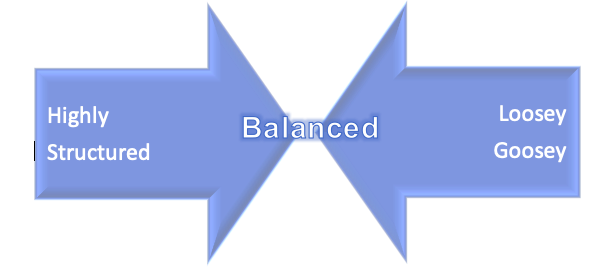
On the left, we have our “highly structured” eaters. This includes individuals strictly following a diet, such as Whole30, Paleo, gluten-free, etc. This is not including the 2-week crash diets, but more long-term.
Next, on the far right we have the our “loosey goosey” eaters. On this end, there is almost no structure, boundaries or plan around what someone is eating each day.
In the middle, you find balance. This does not mean someone on a gluten-free diet for medical purposes needs to start eating wheat bread to be balanced. It’s simply a tool to check in and determine where you are on the spectrum.
Where are you on the Diet Spectrum?
Do you find yourself planning what you are going to eat each day before you get hungry? Or are you waiting to decide what you want in the moment day-by-day or meal-by-meal?
To become highly structured may be useful for setting new habits. Sometimes pressing the reset button with a highly structured diet plan can change how we think about or relate to food.
The question is, what do you need to change to create more balance in your diet? For some it may include more boundaries. Yet for others it may include a permission slip to eat off the plan every so often.
Eating balanced feels different for each of us. Letting go of the shame means embracing our slip ups and planning to do better next time.
Food for thought
As you go throughout your day or week, ask yourself is this choice Well Balanced? We find it most helpful to plan ahead! That way the decision is made before we get bombarded with too many choices.
Do you want to find more balance in your diet and lifestyle? Let’s chat!

